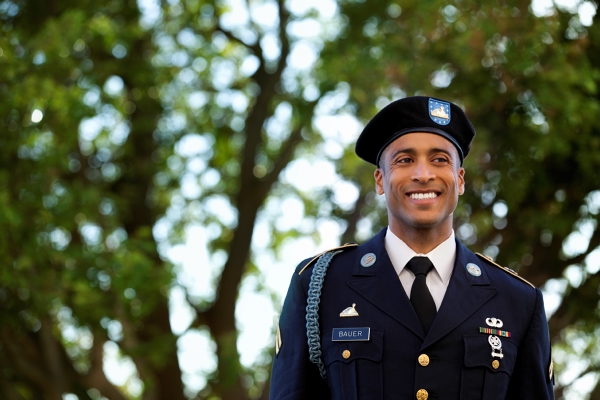Financial preparations for PERMANENT CHANGE OF STATION (PCS)
Having a financial action plan can give you greater control and peace of mind during a PCS move.
Here are some considerations as you prepare:
Learn what’s covered and what you have to pay. Start with the Defense Personal Property System and the Transportation Management Office. Decide if you want a DIY (or do-it-yourself) move.
Review your financial and other accounts. Create a list of all your accounts, from banking and credit cards to insurance and streaming services. Be sure to change your address and update other contact information. This is also a good time to check for lower rates on your insurance policies, such as auto and renters or homeowners and any other policies you may have. During your review, if necessary, update your beneficiary information for SGLI and any other life insurance policies that you have.
Find out if you need extra insurance during your PCS. Talk to your relocation manager to learn what kind of insurance is offered from the military for your move. Determine how your personal and household items will be protected during the move. If you need additional insurance, check to see whether your renters, homeowners, or auto insurance will cover any damage during the move. Discuss any high-value items, such as jewelry, antiques, or family heirlooms that you may have. If you are moving yourself and are contracting with a moving company, find out if your moving company covers damage, breakage, or mold. If not, purchase insurance before they pick up anything. Talk to the transportation and legal offices at your installation for information concerning handling coverage and claims reporting.
Contact your bank or other financial institution. You want to ensure that your banking services are uninterrupted during the move to your new location. Consider signing up for online banking. With online banking, you can check the status of your accounts at any time and from anywhere as long as you have internet connectivity. Online banking allows you to confirm deposits and withdrawals, transfer funds between accounts, pay bills, and more. You will need to decide whether to continue with your current financial institution or change to another financial institution, or add an overseas bank account. Many, if not all, installations have banks on post and agreements with host nation financial institutions. Since some active military members have a PCS up to every 2 to 4 years, it may be helpful to choose a financial institution that operates in most states and has online banking and customer service support. If you want to continue using your current financial institution, be sure to update your contact information. You might need to change your address and have checks printed with your new address for your checking account.
Contact your utility companies. Set up or transfer services. For your new service, inquire about budget billing. If you are leaving the company’s service area, cancel services and provide your forwarding address. The company may need to send you a deposit or send you the final bill. During a move, it’s easy for mail to get misplaced or sent to the old address so be sure to pay all outstanding bills. To make sure all your bills get paid on time, consider automatic bill pay. Even one late payment can have a negative effect on your credit. Or you may want to set an alert or reminder to help you remember to pay the final bill or call the company.
Gather family records. If you are leaving the area, pick up medical records for everyone. Visit your local pharmacy and request an itemized list of all prescriptions and expenses for the year (this is helpful for your new medical professional and for you during tax time). Request school records for your children. If you have a pet, pick up records from your veterinarian. Try to think of any other paperwork or important records that you need before leaving the area.
Keep medical coverage up-to-date. Make sure your health care coverage is easily accessible during your PCS. Getting sick or having a medical emergency while you are preparing for or undergoing your PCS can add to any stress you’re already feeling. You can be better prepared by understanding your TRICARE coverage and updating the Defense Enrollment Eligibility Reporting System (DEERS) with your or your family’s most current information. Your TRICARE benefits will move with you to your new location so update TRICARE once you have your new address. If you, your spouse, or children experience an accident or medical emergency while you’re travelling, go to the nearest emergency room. Save any documentation and receipts from your visit so you can seek reimbursement if necessary. Before your PCS, make sure all the information for you and your family is correct in the database. This will help you avoid unpaid healthcare claims and other problems during the move.

PCS relocation benefits
Understand what benefits are available for PCS
The following basic forms of assistance are for servicemembers who are moving to a base in the continental United States. As benefits are subject to change, consult the Department of Defense for the most up-to-date information.

Overseas, Alaska, and Hawaii PCS benefits
Relocation benefits for overseas, Alaska, and Hawaii
Military members who receive PCS orders to move overseas, or to Alaska or Hawaii may receive relocation benefits also known as OCONUS, or Outside Continental United States.

PERMANENT CHANGE OF STATION (PCS) planning
As soon as you receive your PCS orders, you may want to know how much money you can expect to pay and what benefits are provided by the government. Scheduling a meeting with the relocation manager in your family center can be a good first step. This person can help you figure out which programs can help offset the cost of your move. You can also contact a Defense Finance and Accounting Service (DFAS) pay representative. One of the first things you should know as you get ready for your PCS is how much money you can expect to pay, and what benefits are provided by the government.
You’ll need to decide whether to have the move handled by the Transportation Management Office (TMO) or a Do It Yourself (DIY) move, where you coordinate the move. You’ll want to understand your benefits — both reimbursed and unreimbursed costs. You’ll also need to decide how you will pay for unreimbursed moving expenses, such as rental or utility deposits. Do you have enough savings to cover the expenses? Will you need to save more? Or will you need to temporarily borrow money? Understanding your benefits and planning ahead will help the move go smoother and reduce the stress from last-minute surprises.
Use this checklist to help organize your PCS move.
PERMANENT CHANGE OF STATION (PCS) planning
Use all the resources at your disposal to make sure you’re ready to make the move overseas. Talk to the relocation manager at your current base or peers who have been through the process. Your gaining unit will provide a sponsor to assist in your relocation needs. A Family Readiness Group (or equivalent) will provide additional resources.
Fill out this checklist of questions to help you think about the next steps as you prepare to move. Use these questions as a guide.

